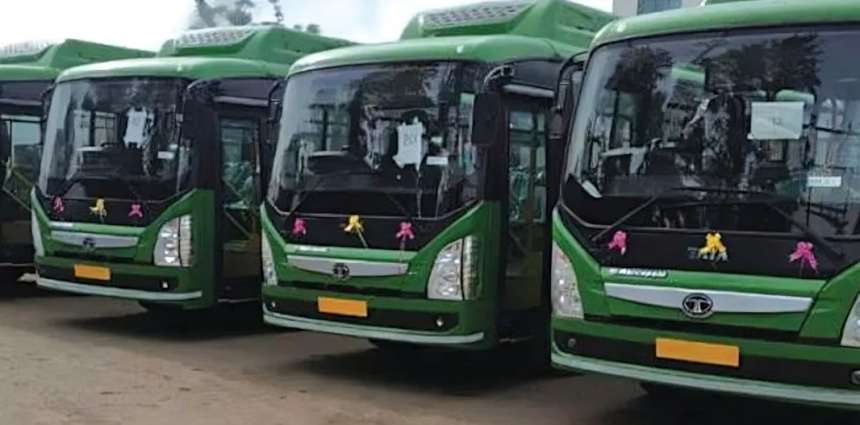Srinagar: In a significant setback for the public transportation system in Srinagar, the much-anticipated launch of 100 additional e-buses has been delayed due to the national tendering process. The new fleet, originally scheduled for rollout in March, will now take longer to become operational.
“The national tendering process has delayed the procurement of the new fleet. We are working closely with the authorities to expedite the process,” said a senior official from Srinagar Smart City Limited (SSCL), who requested anonymity.
Currently, Srinagar operates just 100 e-buses across 16 routes, resulting in overcrowding, particularly during peak hours. The additional buses were expected to ease congestion, reduce waiting times and improve the overall commuting experience. However, with the delay, these improvements will take longer to materialize.
The delay has been particularly frustrating for daily commuters. “I rely on the bus to get to work every day, but the buses are often overcrowded. I just hope the additional buses arrive soon to ease the congestion,” said Yasir, a regular passenger.
“The e-buses have been a great addition to the city, but we definitely need more of them to make commuting easier for everyone,” said Waseem, another commuter.
“I’ve noticed the buses getting busier every day. It’s clear that demand far exceeds what the current fleet can handle,” added Majid, another daily rider.
Interestingly, an integrated study conducted by SSCL revealed that Srinagar requires approximately 600 e-buses to fully meet the demand, underscoring a significant gap between the current fleet size and the needs of commuters. This disparity has contributed to overcrowding and longer wait times.
Despite these ongoing challenges, the e-bus service has been well-received since its launch on November 1, 2023, by LG Manoj Sinha. Referred to as the “mini metro” of Kashmir, the service has garnered praise for its convenience and efficiency. In just the first 60 days of operation, the fleet transported around 5 lakh passengers, highlighting its essential role in the city’s public transport network.
The e-buses come equipped with state-of-the-art features, including ultra-high-definition dash cameras, accessibility options for people with disabilities and passenger-friendly stop push buttons. Additionally, each bus has a heating and cooling system, ensuring comfort during Srinagar’s fluctuating weather conditions.
In 2024 alone, the e-buses transported over 61 lakh passengers, demonstrating the growing reliance on these buses for daily commutes. Notably, these buses generated Rs 11 crore in revenue during their first year of operation, further solidifying their role as a reliable mode of public transport.
In addition to expanding the e-bus fleet, SSCL is also taking steps to enhance the overall public transport infrastructure. To further modernize Srinagar’s transport system, the corporation plans to establish 360 ultra-modern bus stops across the city. These stops will feature Passenger Information Systems (PIS), providing real-time updates on bus schedules, routes, and arrival times. The stops will also include digital displays and route maps, ensuring a smoother and more efficient travel experience for commuters.
Officials have identified key locations based on public demand and feasibility studies, aiming to improve accessibility and create a more seamless transit experience. By strategically placing these bus stops, the initiative seeks to enhance the overall efficiency of the transport system. This effort will complement the expanding e-bus network and address ongoing issues like overcrowding and long wait times.
“The plan is in its final stages,” said the official. “We’re finalizing the details and expect everything to be in place very soon.”
While efforts are underway to expand the e-bus network and modernize public transport infrastructure, the delay in procuring additional buses continues to leave commuters grappling with overcrowded buses and longer waits. As authorities work to expedite the process, passengers remain hopeful that the much-needed improvements will be realized sooner rather than later.








